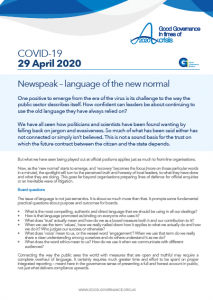Newspeak – language of the new normal
29 April 2020

One positive to emerge from the era of the virus is its challenge to the way the public sector describes itself. How confident can leaders be about continuing to use the old language they have always relied on?
We have all seen how politicians and scientists have been found wanting by falling back on jargon and evasiveness. So much of what has been said either has not connected or simply isn’t believed. This is not a sound basis for the trust on which the future contract between the citizen and the state depends.
But what we have seen being played out at official podiums applies just as much to front-line organisations.
Now, as the ‘new normal’ starts to emerge, and ‘recovery’ becomes the focus (more on those particular words in a minute), the spotlight will turn to the perceived truth and honesty of local leaders, to what they have done and what they are doing. This goes far beyond organisations preparing lines of defence for official enquiries or an inevitable wave of litigation.
Board questions
The issue of language is not just semantics. It is about so much more than that. It prompts some fundamental practical questions about purpose and outcomes for boards.
- What is the most compelling, authentic and direct language that we should be using in all our dealings?
- How is that language promoted as binding on everyone who uses it?
- What does ‘trust’ actually mean and how do we as a board measure both it and our contribution to it?
- When we use the term ‘values’, have we really nailed down how it applies to what we actually do and how we do it? Who judges our success or otherwise?
- What does ‘voice’ mean to us, or the weasel word ‘engagement’? When we use that term do we really share a clear understanding among ourselves and do others understand it as we do?
- What does the word ethics mean to us? How do we use it when we communicate with different audiences?
Connecting the way the public sees the world with measures that are open and truthful may require a complete overhaul of language. It certainly requires much greater time and effort to be spent on proper integrated reporting – meant here in the governance sense of presenting a full and honest account in public, not just what delivers compliance upwards.
Language drives behaviours. Regulators must also take a fresh look at the words they use. They have rightly been accused of fuelling a defensive, backward-looking culture, committing board time to heavy scrutiny of past performance at the expense of engagement with the future.
The immediate opportunity for boards is to set the palette of language they need to use for the new normal. In fact, this might be considered more of an obligation than just a choice. How can you grow more mature governance if the language you use is imprecise, clichéd, does not connect or has any measurable consequences or impact?
A COVID-19 glossary
So what of the emerging terms out there?
Recovery is a good word for what is needed over the next few months. Its origins come from the French for return to health or strength. And it seems to be emerging as a word that crosses borders.
The NHS seems to be yoking recovery with restoration, which seems a little out of kilter with a zeitgeist seeking to renew, regenerate and reset with some ambition. The innovation we have seen over the last few weeks has bolstered this more positive view of potential, in spite of command and control, or perhaps because of it. We may be stuck with restoration as a term, but boards and systems can still define it as a place-based, shared endeavour, in terms that might inspire local trust. What language will do that? An urgent priority and test for the leaders of the new normal is to decide this.
Talking of which, new normal seems to have been widely adopted, for better or worse. It comes with its own assumptions, which need guarding against. Non-millennials may remember the same term being used for the post 2007-2008 crash and the aftermath of the longer global recession – something that was never going to happen again, but is. China also used the term to describe a slow-down in its growth expectations.
More dangerously, new normal suggests some stability in the immediate future, which may be illusory. Post-COVID should be a non-starter for the same reasons. Cheerily, there seems no imminent prospect of anything like that.
Stewardship and legitimacy
Governance is going to be the glue that holds the world together. One challenge which the National Commission on the future of governance faces is also about language and connections. Board members, never mind citizens or policy-makers, do not use words like stewardship or legitimacy very often, but the terms are powerful when properly understood. How can these ideas, central to a sustainable future for the public sector, connect to citizens and come alive?
It would be a real result if the new normal was based on a refreshed palette of language connecting all of this together – publicly-accountable organisations, citizens, the state and the concepts that will protect us in the future, including governance.
The immediate challenge for boards is to play their part and carve out the time, in the face of more obvious pressures, to address the meaning of what is said in their name and its consequences.
Getting a grip on connecting and authentic language could be critical to laying the foundation for trust and the new normal, couldn’t it?
We are keen to hear your views. If this briefing prompts any questions or comments, please call us on 07732 681120 or email us at advice@good-governance.org.uk. We will aim to respond within 24 hours.

